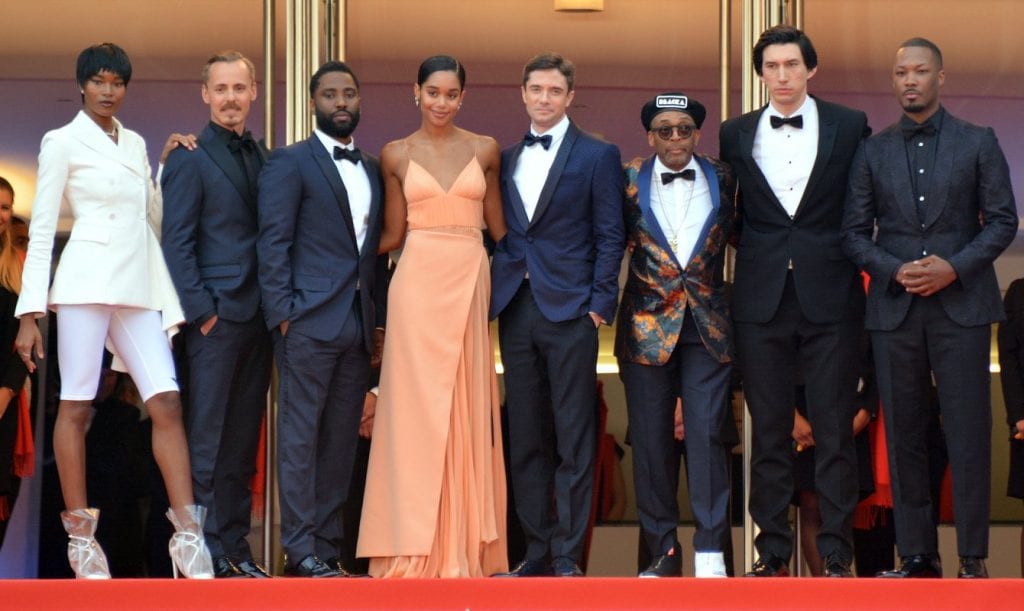The Spike Lee-directed, Jordan Peele-produced summer movie BlacKkKlansman was everything you can imagine from the title. A story based on real events has hit the movie world to surprising success. Making over $10 million dollars in sales on its opening weekend, it also received countless standing ovations at festivals, including the theater I saw the movie in. The in-depth story of the first black officer in Colorado Springs quickly transitions into a sting operation, where the same officer successfully infiltrates the Ku Klux Klan. Set in the 70s, the story is littered with racial bias and nuances of the time period. Strong racial language made the story a bit heavy at times but to see a glimpse of the neo-Nazi ideology unfold will serve as a beacon for truth for many years. Let me explain why.
BlacKkKlansman is not some righteous portrayal of a cop doing good for his people but simply an accidental operation that turned out to land on the morally right side of history. It is more of a detailed manifestation of the undertones of white nationalism and white supremacy. It is distinct and precise in its approach to gain access into the world of the “Organization” better known as the KKK.
Spike Lee showcases his directorial genius by creating a film that almost reminds you of a self-serving KKK documentary than a counter-operative mission against them. He slowly takes the audience through the underworking of hatred and how it is derived through the use of “white nationalism” and “white supremacy,” while displaying the glaring differences between “white power” and “black power”. The movie starred John David Washington as Ron Stallworth, and Adam Driver as Flip, who becomes the white version of Ron Stallworth when the KKK asks to meet him in person. The interesting dynamic is that Flip is a Jewish man who has never acknowledged his heritage. The film is a peculiar depiction of a black man, Stallworth, discovering himself alongside a Jewish man, Flip, who is discovering his own religious and political ideology as he fights through the racial discomfort in the presence of neo-Nazi’s, who believe the Holocaust was a hoax.
This film was not made for black folks to stand and clap at the end. This movie was made for white Americans who seem to align themselves with hateful rhetoric, purposely or not. This movie is more about the group of white cops who allowed this black man to infiltrate and thwart the radical ways of the KKK chapter in Colorado Springs. Spike Lee uses smart and seemingly clear-cut references that make you feel as if the story could happen at this very moment in time. This was displayed most effectively in a scene with storied activist/philanthropist Harry Belafonte sitting in the famous bamboo chair that Huey Newton of the Black Panthers sat in, telling a story to the Black Student Union. In this scene, Belafonte recounts a story about Jesse Washington, a black man who was lynched in 1916. This story sets a tone for the climax of the film and offers some insight on how black America has dealt with oppression and violence throughout the century.
Why is BlacKkKlansman so relevant?
This movie is relevant because it is eerily relatable to the political climate of today. President Donald Trump’s lack of empathy and disregard for human life has stirred racial feelings similar to the timeframe of this film. It comes on the one-year memorial of the death of Heather Heyer, who was murdered last year at the Unite the Right Neo-Nazi March in Charlottesville, Virginia, which is detailed before the closing credits. This unimaginable hatred still exists in our country and BlacKkKlansman doesn’t shy away from that point at all.
Spike Lee has publically spoken out against the president and he isn’t reluctant in dealing with that in the dialogue of the movie. He was able to drop subtle lines that make you think and at times cringe. Overall, the film is great and full of small details worth exploring on your own. The biggest take away I got from the film is that it was a black man articulating the story of the KKK. In a world full of cultural appropriation, it was a clear-cut thorn to the side of the KKK and as a black man, I appreciated every moment of it. I do want to give a legitimate shoutout to That 70s Show star, Topher Grace, who played a young David Duke, Head Master of the KKK. The cast who played the Neo-Nazi organization was phenomenal and really made the movie as real as they can make it.
What we learned
If we only learn one thing from the film, it’s is that in order to fight hatred and racism we need to work together. It can’t be the hated fighting the hateful while the undecided sit on the sidelines. Those that are not on the side of hate should put their lives and careers on the line as we do to eradicate these hateful ideologies from our American society. BlacKkKlansman will go down as one of Spike Lee’s most important films.
Spike Lee’s BlacKkKlansman- 4.5 out 5 stars


